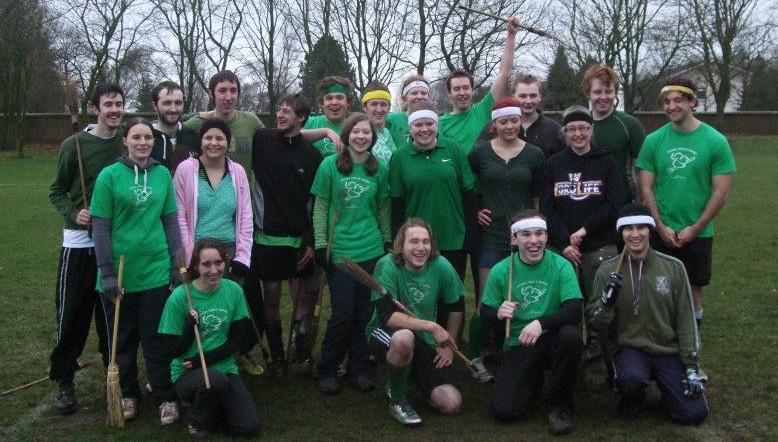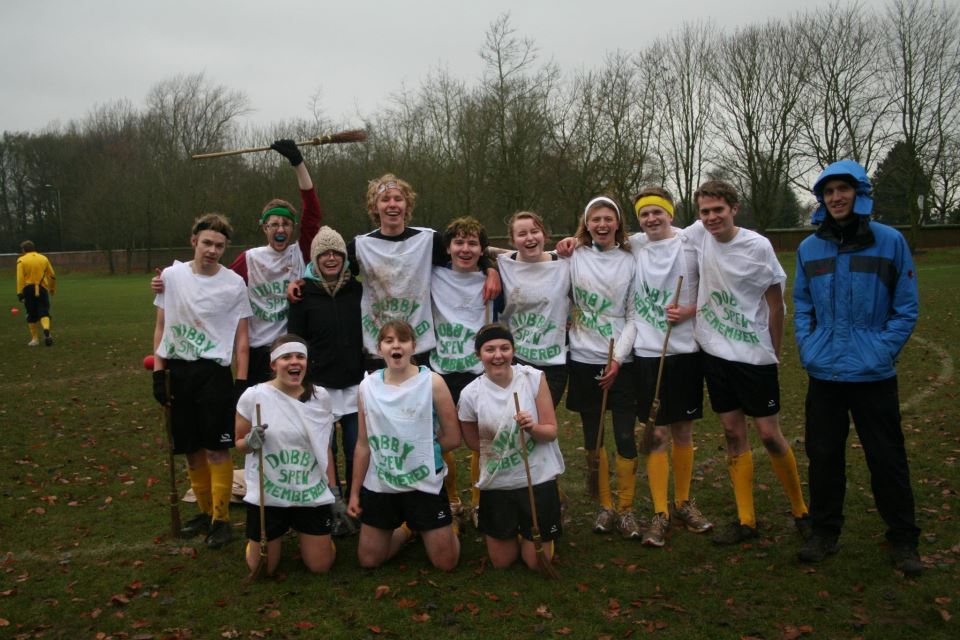- Rule, Britannia, no more?
- Unpopular Opinions: US Quadball Cup 2023
- Proven Contenders: University of Virginia
- Proven Contenders: Rutgers University
- Proven Contenders: University of Michigan
- Proven Contenders: Creighton University
- Different Perspectives: A Look Inside USA Ultimate
- Antwerp QC, Much of Belgian Core, Leaves Competitive Quidditch
The British are coming, the British are coming…
- Updated: December 13, 2012

This is a guest article, written by Matthew Guenzel, the head of gameplay at QuidditchUK. We will be publishing guest articles on a semi-regular basis. If you are interested, please contact us at editors@eighthman.com.
Many players outside of the UK are unfamiliar with the state of quidditch in the United Kindom, so this article provides a handy guide to who’s who and what teams to watch out for in the upcoming British Quidditch Cup.
When asked who the top team in the UK is, Most UK quidditch players will answer with Avada Keeledrava. One of the oldest teams in the UK, Keele University lays claim to current Chairman of QuidditchUK, Ben Morton, and seeker for Team UK, Robbie Dugald. With this absolute powerhouse dominating the snitch game and featuring excellent leadership on the sidelines, the usual win for Keele goes something along the lines of scoring two or three goals to get a quick lead before Dugald catches the snitch. This solid tactic is based on a simple concept: don’t give the opposition team a chance to get going. In their first game against Bangor University just a few weeks ago, the seeker floor lasted ten minutes and the game lasted only fourteen.
However, it’s not all cheery for the green squirrels from Stoke. Basing their strategy on the seeker position can sometimes lead to overconfidence from their on-pitch players. The danger of this type of overconfidence was clearly seen in their last game against Bangor, where they lost 110-30. Additionally, if key powerhouse players like seeker Dugald, keeper Robert Barringer or keeper Alex Greenhalgh are not in play, the team quickly falters. Still, there’s a reason they’re known as the top team in the UK: they have an excellent collection of strong players in key positions and an absolute winner’s mentality.
With Keele described as the top team in the UK, the second place team would have to be the Leicester Lovegoods. Leicester features excellent chasers such as Owain Morris and Abbi Harris, backed up by the veritable 6 feet 5 inches beater Jack Hill. Most of the players on the Lovegoods roster have previous sports experience, including several members of Team UK from the Summer Games. Their reliance on the strength of the individual athlete over the unity of the team is in part their greatest strength and their greatest downfall. Goals are often scored by fast breaks by individual chasers with little beater support, and the team notoriously struggles with passing when under pressure.
The Lovegoods are occasionally known to slip from proper tackling form, resulting in avoidable penalties which cost the team dearly. The comparison and basic difference between Keele and Leicester is a simple one: Keele focuses on the snitch-seeker game, and Leicester focuses on pitch play. Every loss for the Leicester squad has been lost by a snitch grab, and while they may have the strongest on-pitch game, team unity and balance in all positions is essential for solid victory.
Next up is the Leeds Griffins team, certainly an upcoming team to watch out for in the coming months. Although they are a new team, having only played three games so far, they defeated Leicester Lovegoods in their debut game this autumn. Team captain Travis Manuel understands the flow of the sport and engages with the game on a tactical level, and his natural leadership is a strong benefit to the team. Before their debut game, Manuel researched his opposition and devised multiple strategies with which to approach the Leicester game, even discussing the upcoming game with captains from other teams.
Supporting this leadership is the strength of the Leeds beaters. Throughout the entirety of their games against the Lovegoods, their beaters were on the ball, both literally and figuratively. Lauren Lafevre is perhaps the best example of a Leeds beater who was hard to follow: one minute she was on the defence, the next she was deep in the opposing team’s keeper zone. The excellent leadership of Manuel combined with the talent of key players such as Lafevre set Leeds up beautifully to take a top place at the British Quidditch Cup.
Nobody knew what to expect when Bangor SQUIB arranged to play Keele in November, and many were surprised to see a team of completely dedicated players whose hard work put them as competitive opposition against Keele. Pivotal chasers such as Ben Honey and team captain Emily Oughtibridge are used to put heavy pressure on the opposing team, often leading to clumsy mistakes, such as Keele player Steven Titley falling flat on his face seconds after leaving his keeper zone.
The Bangor team has a number of strengths that will give them opportunities to succeed, including excellent teamwork, passing, and communication on pitch. They may not have any fancy tricks or powerhouse players, but they find success by doing the basics exceptionally well. So what’s holding Bangor back? Quite simply, they play rough, and calls on illegal physical contact will weaken this team if they don’t improve their tackling form. In addition, extra focus could be placed on Bangor’s seeking game; in comparison to Keele seeker Robbie Dugald, Bangor’s seekers struggled. If they tighten up on their contact and place more emphasis on their seekers, they can make a tangible impact at the BQC.
Finally, clad in dark blue and excellent academic clout, Oxford Quidditch is led by formidable chaser Angus Barry. With a collection of dedicated and physically capable players, when Oxford hit, they hit hard. In their recent games against Reading Rocs they dominated with their much larger team and considerable experience.
It’s clear that not much separates the top league of teams in the UK. At least another fifteen or so teams in the UK haven’t played a game yet this term and could give a surprisingly strong performance. The best indicator will be the Highlander Cup, taking place in March, which most of the above mentioned teams are attending. This tournament will be a good indicator of the current state of UK quidditch and which team will be the favourite to win the first ever British Quidditch Cup later in the spring.


